

People power transforms the web in next online revolution. In July 2004, US cinema advertisements for Halo 2, the science fiction computer game, briefly carried the address for a website - ilovebees.com - which appeared to belong to a beekeeper who had mysteriously disappeared.
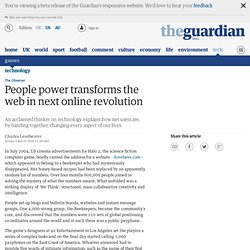
Her honey-based recipes had been replaced by an apparently random list of numbers. Over four months 600,000 people joined in solving the mystery of what the numbers meant. What unfolded was a striking display of 'We Think': structured, mass collaborative creativity and intelligence. People set up blogs and bulletin boards, websites and instant message groups. The Web Turns 20: Linked Data Gives People Power, Part 1 of 4. Editor's Note: The World Wide Web went live 20 years ago this month, on a single computer in Geneva, Switzerland.
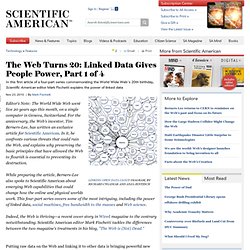
For the anniversary, the Web's inventor, Tim Berners-Lee, has written an exclusive article for Scientific American. The People Power Revolution in the Philippines. The Power of Active Nonviolence and Truth Movements Author: Richard Deats.

Earth Hour. Looking back at the year of ‘people power’ The Emergence of People Power in a Young Democracy (Special Analysis) We’ve all heard the phrase that “perception is (a big part of) reality.”
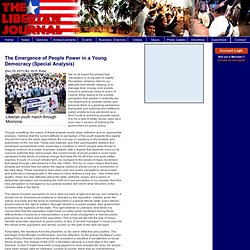
Perception certainly informs our attitudes and beliefs, helping us to manage time, energy, and anxiety around a particular need or event. In Liberia, there seems to be a public perception that people in authority are not responsive to societal needs, and because there is a growing awareness that power and authority are indifferent, public protest is now perceived as a short route to achieving societal needs. Internet Website News: Latest. Columns / B S Raghavan : Ringing in the era of people's power. We Are Power Shift. Learn about nonviolent conflict and civil resistance. 2011: The year of people power. TIME finally owns up to people power. Politics and the Power of the Web.
According to research by Hanover Communications, the Labour backbench MP Tom Watson had a higher media profile in 2011 than every shadow minister, except for Ed Miliband and Ed Balls.
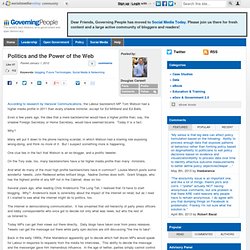
Even a few years ago, the idea that a mere backbencher would have a higher profile than, say, the shadow Foreign Secretary or Home Secretary, would have seemed bizarre. Today it is a fact. Why? Many will put it down to the phone hacking scandal, in which Watson had a starring role exposing wrong-doing, and think no more of it. But I suspect something more is happening. Some Real Issues for 2012. The presidential election may be grabbing headlines, but the true rallying cry for 2012 is to struggle and organize around those issues that a president might take seriously, to stake out positions that would benefit what used to be called the working class (and now goes by “the 99 percent”) and to garner enough political will and power to pressure the president and Congress to move resolutely on the issues that matter.
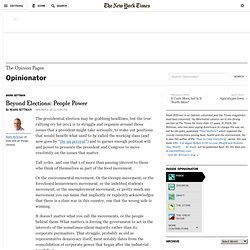
Tall order, and one that’s of more than passing interest to those who think of themselves as part of the food movement. Or the environmental movement. Or the Occupy movement, or the foreclosed homeowners movement, or the indebted students movement, or the unemployment movement, or pretty much any movement you can name that implicitly or explicitly acknowledges that there is a class war in this country, one that the wrong side is winning.
It doesn’t matter what you call the movements, or the people behind them. Whatever. Why? And here's to the year of people power. Cartoon: Cathy Wilcox.
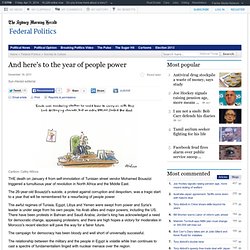
THE death on January 4 from self-immolation of Tunisian street vendor Mohamed Bouazizi triggered a tumultuous year of revolution in North Africa and the Middle East. The 26-year-old Bouazizi's suicide, a protest against corruption and despotism, was a tragic start to a year that will be remembered for a resurfacing of people power. The awful regimes of Tunisia, Egypt, Libya and Yemen were swept from power and Syria's leader is under siege from his own people, his Arab allies and major powers, including the US. There have been protests in Bahrain and Saudi Arabia; Jordan's king has acknowledged a need for democratic change, appeasing protesters; and there are high hopes a victory for moderates in Morocco's recent election will pave the way for a fairer future.
The campaign for democracy has been bloody and well short of universally successful. Advertisement. People power comes to Russia. Opposition protest rallies across Russia Dozens arrested across Russia as opposition party calls for mass rallies around the country. 11, 2011 VLADIMIR PUTIN'S return to the Kremlin as president next year may not be the smooth limousine ride he expects, judging from growing protests across Russia against the way his ruling party hijacked recent parliamentary elections.

Significantly, the people coming onto the streets are not opposition regulars but ordinary citizens who have never demonstrated before. People Power of Santa Cruz County - News - People Power Launches New Website Services. Sustainability News. What are the prospects for sustaining high-quality groundwater? Intensive agriculture practices developed during the past century have helped improve food security for many people but have also added to nitrate pollution in surface and groundwaters.
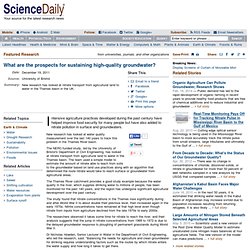
New research has looked at water quality measurement over the last 140 years to track this problem in the Thames River basin. Agro-ecology methods are key to food security. Agro-ecological farming methods, not industrial-scale agriculture will be needed to ensure food security and protect food supplies from the impacts of climate change, argues Olivier De Schutter, UN Special Rapporteur on the Right to Food.

He challenges the widely held view that food production needs to be scaled up to feed a growing population, saying that such a strategy overlooks climate change as well as how food is produced, by whom and for whom. Agro-ecology attracted interest during negotiations at the COP 17 climate change conference in Durban, South Africa, says De Schutter, and provides an opportunity to tie together the food security and climate change agendas. The seriousness of food crises "is needed to re-inject urgency into climate talks", and an awareness of climate change can keep food security discourse on the right track. Climate change is already affecting the global food supply, creating food shortages and famine. Durban talks: how Connie Hedegaard got countries to agree on climate deal. Connie Hedegaard, the EU's climate chief, has been hailed the hero of the Durban meeting that reached an unexpectedly solid outcome in the early hours of Sunday . "She is very, very good and we are very lucky to have her," says Chris Huhne, the UK energy and climate change secretary.
"She held everything together in a very impressive manner – a class act. " Hedegaard, below, once the youngest person elected to the Danish parliament, was the architect of the EU plan to gather developed and developing economies together for the first time in a legally binding agreement to cut greenhouse gas emissions. A deal was struck that met nearly all of the EU's aims, satisfied most developing countries and even brought the US on board. In doing so, Hedegaard saved the UN process of negotiations, which without a deal at Durban would have fallen apart. "You could hear the shifting of tectonic plates," said one diplomat. Key to her success was the hardline attitude Hedegaard adopted. Which nations are really responsible for climate change - interactive map. Uld the desert sun power the world? During the summer of 1913, in a field just south of Cairo on the eastern bank of the Nile, an American engineer called Frank Shuman stood before a gathering of Egypt's colonial elite, including the British consul-general Lord Kitchener, and switched on his new invention.
Gallons of water soon spilled from a pump, saturating the soil by his feet. Behind him stood row upon row of curved mirrors held aloft on metal cradles, each directed towards the fierce sun overhead. As the sun's rays hit the mirrors, they were reflected towards a thin glass pipe containing water. The now super-heated water turned to steam, resulting in enough pressure to drive the pumps used to irrigate the surrounding fields where Egypt's lucrative cotton crop was grown.
It was an invention, claimed Shuman, which could help Egypt become far less reliant on the coal being imported at great expense from Britain's mines. "It's all systems go in Morocco," announced Paul van Son, Dii's CEO, to the visiting delegates. Electrification of everything.